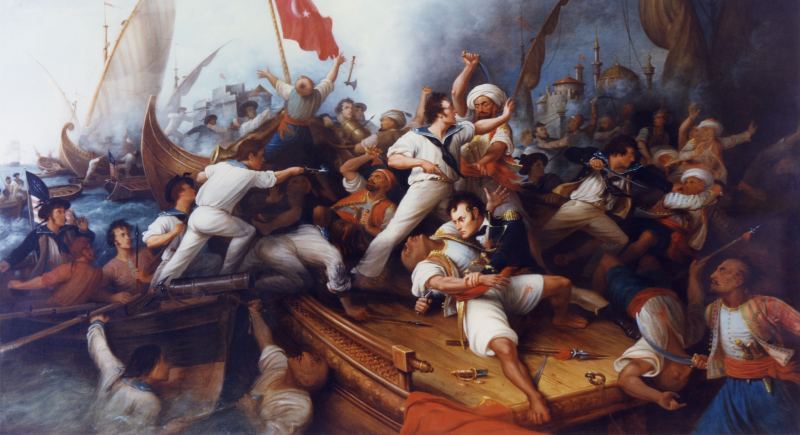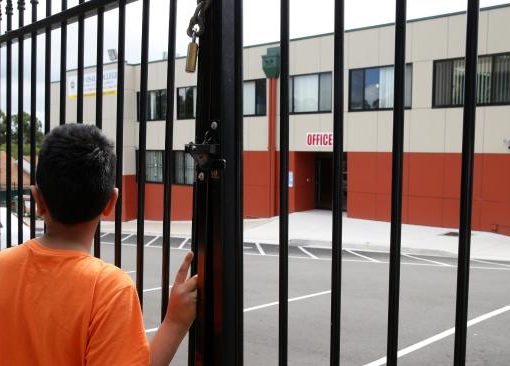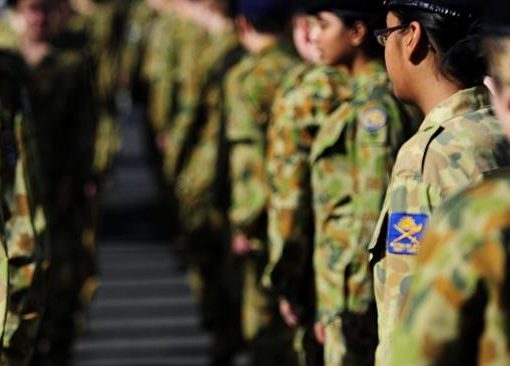
When Thomas Jefferson saw there was no negotiating with Muslim pirate overlords, he formed what is now the Marines (sea going soldiers). These Marines were attached to U. S. Merchant vessels. When the Muslims attacked U.S. merchant vessels they were repulsed by armed soldiers, but there is more.
The Marines followed the Muslims back to their villages and killed every man, woman, and child in the village. It didn’t take long for the Muslims to leave U.S. Merchant vessels alone.
English and French merchant vessels started running up our flag when entering the Mediterranean to secure safe travel. That is why the marine Hymn contains the verse, “To the Shores of Tripoli ” one of the ports the pirates used.
THE HISTORY: At the height of the 18th century, Muslim pirates (the “Barbary Pirates”) were the terror of the Mediterranean and a large area of the North Atlantic and piracy was costing the American purse 20% of their total economy.
The pirates attacked every ship in sight, and held the crews for exorbitant ransoms. Those taken hostage were subjected to barbaric treatment and wrote heart-breaking letters home, begging their governments and families to pay whatever their Islamic captors demanded.
These extortionists of the high seas represented the North African Islamic nations of Tripoli, Tunis , Morocco , and Algiers - (Morocco, Algeria, Tunisia, Libya,) collectively referred to as the Barbary Coast - and presented a dangerous and unprovoked threat to the new American Republic .
Before the Revolutionary War, U.S. merchant ships had been under the protection of Great Britain . When the U.S. declared its independence and entered into war, the ships of the United States were protected by France. However, once the war was won, America had to protect its own fleets.
Thus, the birth of the U.S. Navy. Beginning in 1784, 17 years before Jefferson would become president, Thomas Jefferson became America’s Minister to France. That same year, the U.S. Congress sought to appease its Muslim adversaries by following in the footsteps of European nations who paid bribes to the Barbary States rather than engaging them in war. (Jizya)
In July of 1785, Algerian pirates captured American ships, and the Dye of Algiers demanded an unheard-of ransom of $60,000. It was a plain and simple case of extortion, and Thomas Jefferson was vehemently opposed to any further payments.
Instead, he proposed to Congress the formation of a coalition of allied nations who together could force the Islamic states into peace. A disinterested Congress decided to pay the ransom.
In 1786, Thomas Jefferson and John Adams met with Tripoli’s ambassador to Great Britain to ask by what right his nation attacked American ships and enslaved American citizens, and why Muslims held so much hostility towards America, a nation with which they had no previous contacts.
The two future presidents reported that Ambassador Sidi Haji Abdul Rahman Adja had answered that Islam “was founded on the Laws of their Prophet, that it was written in their Quran that all nations who would not acknowledge their authority were sinners, that it was their right and duty to make war upon them wherever they could be found, and to make slaves of all they could take as prisoners, and that every Musselman (Muslim) who should be slain in battle was sure to go to Paradise.”
Jefferson decided to look into the matter further, and did the one thing every leader should do—He read the Koran.
Yet, despite this stunning admission of premeditated violence on non-Muslim nations, as well as the objections of many notable American leaders, including George Washington, who warned that caving in was both wrong and would only further embolden the enemy, for the following fifteen years, the American government paid the Muslims millions of dollars for the safe passage of American ships or the return of American hostages.
The payments in ransom and tribute amounted to over 20 percent of the United States government annual revenues in 1800.
Jefferson was disgusted. Shortly after his being sworn in as the third President of the United States in 1801, the Pasha of Tripoli sent him a note demanding the immediate payment of $225,000 plus $25,000 a year for every year forthcoming. That changed everything. Jefferson let the Pasha know, in no uncertain terms, what he could do with his demand.
The Pasha responded by cutting down the flagpole at the American consulate and declared war on the United States. Tunis, Morocco, and Algiers immediately followed suit.
Jefferson, until now, had been against America raising a naval force for anything beyond coastal defence, but, having watched his nation be cowed by Islamic thuggery for long enough, decided that it was finally time to meet force with force.
In March 27, 1794, the United States Congress had authorised the construction of six frigates, the first ships of the United States Navy, the USS Constitution, the USS Chesapeake , the USS Constellation , the USS President, the USS United States, and the USS Congress. The ships were designed to be heavy frigates – longer and faster than the conventional frigates of their day, able to stand and fight against any ships their size and fast enough to evade larger ships of the line.
He dispatched a squadron of frigates to the Mediterranean and taught the Muslim nations of the Barbary Coast a lesson he hoped they would never forget. Congress authorised Jefferson to empower U.S. ships to seize all vessels and goods of the Pasha of Tripoli and to “cause to be done all other acts of precaution or hostility as the state of war would justify”.
When Algiers and Tunis, who were both accustomed to American cowardice and acquiescence, saw the newly independent United States had both the will and the right to strike back, they quickly abandoned their allegiance to Tripoli.
The war with Tripoli lasted for four more years, and raged up again in 1815. The bravery of the U.S. Marine Corps in these wars led to the line “to the shores of Tripoli” in the Marine Hymn, and they would forever be known as “leathernecks” for the leather collars of their uniforms, designed to prevent their heads from being cut off by the Muslim scimitars when boarding enemy ships.
The result was that the United States and the Christian nations of Europe were then able to keep the Muslims at bay for over a hundred years.
The French went so far as to invade Algeria and colonise it with Europeans. But in 1960, Charles de Gaulle undid it all — and now there are over five million Muslims in France.
Indeed, the loss of Christian nerve has once more opened the gates of the West to a barbaric Muslim offensive.
Top recommendations
- Casino Utan Spelpaus
- Casino Non Aams
- Crypto Casino
- Casino Non Aams Sicuri
- Casino Sites Not On Gamstop
- Migliori Casino Online Non Aams
- UK Casino Not On Gamstop
- Gambling Sites Not On Gamstop
- Slots Not On Gamstop
- Non Gamstop Casino Sites UK
- Sites Not On Gamstop
- Online Casinos
- Not On Gamstop Casinos
- Non Gamstop Casinos UK
- オンラインカジノランキング
- Gambling Sites Not On Gamstop
- Casino Online Non Aams
- UK Online Casinos Not On Gamstop
- Melhores Cassinos Online 2025
- Non Gamstop Casinos UK
- Gambling Sites Not On Gamstop
- Online Casino
- Casino Not On Gamstop
- Non Gamstop Casino Sites UK
- Best Non Gamstop Casino
- Crypto Casino
- Casino En Ligne
- Tous Les Sites De Paris Sportifs Belgique
- Tous Les Sites De Paris Sportifs Belgique
- Meilleur Site Casino En Ligne Belgique
- Casino Online Non Aams
- Casino En Ligne Fiable
- Casino En Ligne France
- Nouveau Casino En Ligne France
- Migliori Casino Senza Verifica
- Meilleur Casino En Ligne France
- Casino Fiable En Ligne
- Site De Casino En Ligne
- 토토사이트
- Migliori Casino Online Italia




2 thoughts on “America’s First War was against Muslims 200 Years Ago”
you can bet your bottom $ that & other similar history’s not in the current history curriculum of schools across the US anymore, saw on tv the other day College students & late teens in the streets hadn’t even been taught Anything about WW2, in which their parents, or at least grandparents may have paticipated…..”D-day?”-ans.”don’t know”…., who was Churchill?..ans
“Don’t know”…Which countries composed the Allies?… One I believe replied “Mozart?”…..how many stars on the American Flag & what do they represent? -
“don’t know”….all reminiscent of when Sonny Bono was divorcing Cher, only a derigatory quip, but he was quoted as saying “She’s so dumb, she thinks Mt Rushmore,(& for those who’re also unaware, its the one with the Presidents faces sculptured into it) is a ‘naturally occuring phenomenon’….. question,’what the hell is taught in high schools there anymore?’. I & many others despair for their future… it looks bleak to say the least….🤔🙄🙁
Typical of France. Now today Muslim give them payback because of one stupid little man.Charles de Gualle.